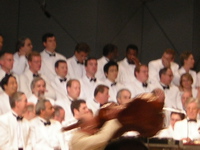New York Times: Reviving His Works, on Paper and Plaster. With William Faulkner’s house, Rowan Oak, newly restored to the somewhat eccentric condition in which its owner left it (houseblogger beware! “haphazardly laid pine floors” and “brick patios like wings” that “fostered rot” and “diluted the whole Greek Revival vibe” lurk within), it seems an appropriate time for a confession.
![]()
Thirteen years and change ago, I was with the Glee Club on what seemed like a never-ending Tour of the South. We had left Charlottesville, opened in Chapel Hill, proceeded to Athens and Atlanta, and made a stop in Jackson, MI before pulling into Oxford for the night. At that point we were all a little disconcerted to find that Oxford buttoned up its sidewalks at 8:30 at night—and since we had been on a bus for a Very Long Time, we wanted to get out and find something to do. So, while some of the group went off in search of house parties at Ole Miss, a few more literary-minded individuals (I’m not naming names, but I’ve talked about one of them before, and another is now a minister) piled into a car in search of Faulkner’s home.
It was after 10 when we walked up the front drive and found the house. We had joked and laughed in the car, which we left parked at the top of the drive; now we were soberer. I remember it was a moonlit night and we seemed awfully exposed. But it was quiet and still except for the crunch of gravel underfoot; and luminous around us except for the small cloud of dust raised by our feet. We stood at the base of the steps leading up to the back porch—that porch that the writer, between novels, added along with his office, that office on the walls of which was scrawled in graphite and grease pencil the skeleton of a novel; that office in which rests the typewriter that crackled and popped with the writer’s thoughts, now silent.
– It’s a sad house, said the future minister. – It feels as though it’s incomplete and is waiting for someone.
And then there was a pop from inside, a crack as though someone had trod on the floors—those same rough pine floors haphazardly laid by the writer during one renovation or other. We held our breath.
But no ghosts arrived, no night watchman shining suspicious flashlights. And no bleary eyed writer clutching a glass invited us up on the porch.
![]()
Now, if Faulkner could read Oprah’s tips on how to get through The Sound and the Fury, I think the house would be doing more than crackling. Probably it would be making sounds more like the advice at the end of Tod Goldberg’s post on the same subject.


